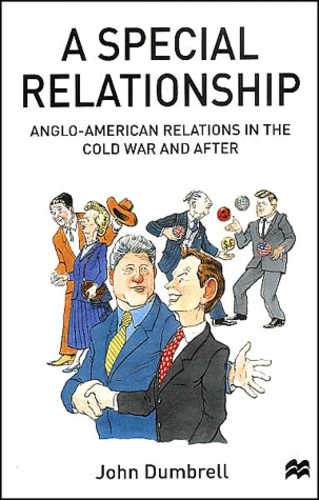A Special Relationship. Anglo-American Relations In The Cold War And After
Par :Formats :
Définitivement indisponible
Cet article ne peut plus être commandé sur notre site (ouvrage épuisé ou plus commercialisé). Il se peut néanmoins que l'éditeur imprime une nouvelle édition de cet ouvrage à l'avenir. Nous vous invitons donc à revenir périodiquement sur notre site.
- Paiement en ligne :
- Livraison à domicile ou en point Mondial Relay indisponible
- Retrait Click and Collect en magasin gratuit
- Réservation en ligne avec paiement en magasin :
- Indisponible pour réserver et payer en magasin
- Nombre de pages258
- PrésentationBroché
- Poids0.35 kg
- Dimensions14,0 cm × 21,5 cm × 1,5 cm
- ISBN0-333-62250-2
- EAN9780333622506
- Date de parution01/01/2001
- ÉditeurMacmillan
Résumé
Conceived and born out of the wartime collaboration of allies and nurtured by shared interests and negotiated compromises in the Cold War, the notion of a special relationship between the United States and Britain has occupied a special place in the vocabulary of politicians and commentators for more than half a century. Unlike most accounts of the 'special relationship'this wide-ranging assessment of Anglo-American relations argues that, while shared interests have been of crucial importance, closeness has been sustained as much by shared culture. The book focuses particularly on the period since 1960, by which time the radical asymmetry of power between Britain and the United States had clearly emerged. Despite this, John Dumbrell argues, the relationship has been marked by a considerable amount of mutuality rather than simply American dominance. While the relationship has always been more 'special'for Britain the United States had and has 'special relationships'with many countries - and has been marked by tensions, for example over Vietnam and Ireland, it has been far deeper than most alliances for a very considerable period.
The quality of personal relations between leaders has varied considerably from such difficult and prickly ones as both Macmillan's and Wilson's with Johnson to the much closer ones enjoyed by Kennedy and Macmillan and by Thatcher and Reagan. The book highlights the extent to which these personal leader relations have, however, rested on a base of institutionalised diplomatic and military cooperation. Despite the much-vaunted closeness of Clinton and Blair at the dawn of the twenty first century, John Dumbrell argues that the end of the Cold War, changes in culture and identity and the impact of closer. European integration will make the Atlantic relationship less central than it was for the latter part of the twentieth century.
Conceived and born out of the wartime collaboration of allies and nurtured by shared interests and negotiated compromises in the Cold War, the notion of a special relationship between the United States and Britain has occupied a special place in the vocabulary of politicians and commentators for more than half a century. Unlike most accounts of the 'special relationship'this wide-ranging assessment of Anglo-American relations argues that, while shared interests have been of crucial importance, closeness has been sustained as much by shared culture. The book focuses particularly on the period since 1960, by which time the radical asymmetry of power between Britain and the United States had clearly emerged. Despite this, John Dumbrell argues, the relationship has been marked by a considerable amount of mutuality rather than simply American dominance. While the relationship has always been more 'special'for Britain the United States had and has 'special relationships'with many countries - and has been marked by tensions, for example over Vietnam and Ireland, it has been far deeper than most alliances for a very considerable period.
The quality of personal relations between leaders has varied considerably from such difficult and prickly ones as both Macmillan's and Wilson's with Johnson to the much closer ones enjoyed by Kennedy and Macmillan and by Thatcher and Reagan. The book highlights the extent to which these personal leader relations have, however, rested on a base of institutionalised diplomatic and military cooperation. Despite the much-vaunted closeness of Clinton and Blair at the dawn of the twenty first century, John Dumbrell argues that the end of the Cold War, changes in culture and identity and the impact of closer. European integration will make the Atlantic relationship less central than it was for the latter part of the twentieth century.


